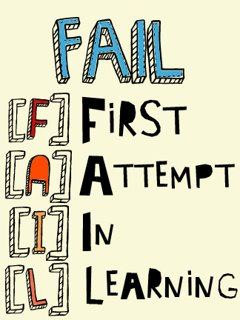As young entrepreneurs, we are creators. Visionaries, if you will. As we dream up and build our businesses and startups entirely from scratch, we rarely (if ever) factor in the inevitability of failure at some point along the way. Why would you? In the beginning, it feels like nothing can stand in your way of success. During the countless hours of blood, sweat and tears you pour into your business, there’s typically a voice in the back of your mind that repeats “failure is not an option, failure is not an option…” which becomes the driving force behind all your efforts, especially when times are tough.
In my mid-twenties, I used to feel like failure was not an option for me.
I was confident that if I gave 110% to my business, it would succeed—I would succeed. Nothing could stop me. I was smart, talented, motivated and extremely dedicated to my vision. But then when I closed the doors on my first full-time entrepreneurial endeavor, I watched over $100,000 go down the drain. Gone. This wasn’t the first failure in my life, but it was definitely the biggest, most magnificent failure of them all.
When you’re new to failure, it takes a while to recover. For me, it took over a year to pick myself up and get back in the saddle. Since that time, I’ve begun to factor failure into my business strategy. Not in a negative way, but just as a normal part of the process of being an entrepreneur.
The truth is, real entrepreneurs fail. They fail fast and they fail often. They embrace failure—sometimes learning to absolutely love it—because failure is the time that you will learn the very most as a small business owner. Plus, typically, you’ll find that the magnitude of your success is in a direct ratio to the frequency and size of your failures.
If you haven’t failed at something yet, chances are, you’re playing it too safe. It’s like driving a car—you will never actually know how fast your car can go until you accelerate to the point of being out of control. Entrepreneurs are not in the business of playing it safe. We know that no one ever got ahead by not taking risks. We hang out on the very edge of what is comfortable and push those boundaries every single day.
If you can get comfortable with failure now and start to build up your resilience, you will be way ahead of the game and have a better chance of staying self-employed in the long-term.
Once you realize that failure is just a normal part of the entrepreneurial experience, how can you make it work for you? How can you benefit from all the times that you have (or will) fall on your face? How can you start to recover quicker?
Here are 3 steps to turn your immediate failures into lasting successes…
#1: Reframe the situation
No matter how painful it might feel at the time, failure is temporary if you use it as an opportunity for learning and growth. Don’t base your self-esteem on your failures. Try to reframe your current situation by looking the positives that you can take away from it. Ask a close friend or colleague to give you a fresh perspective on the circumstances—generally it’s not as bad as you think it is in your head (and 9 times out of 10 will turn out to be a good thing in the long run).
Be sure to take a breather before jumping right back in and risking making bad business decisions when you’re feeling emotional. Take the down time you need to collect yourself and put your situation into perspective.
#2: Extract the lessons
You will learn more from your failures than from your successes. That’s why it’s important to learn ALL YOU CAN when you’re faced with an immediate failure. Tony Robbins says, “I’ve come to believe that all my past failure and frustration were actually laying the foundation for the understandings that have created the new level of living I now enjoy.”
In order to cultivate your success foundation, make a list of everything you learned from your failure—about your business, about yourself, and about your life. Use these lessons to sharpen your objectivity and strengthen your resilience. You want to move forward making new mistakes, not repeating old ones over and over again.
#3: Move forward
For entrepreneurs, if plan A doesn’t work out, there is always a plan B (whether you realize it at the time or not). In my case, it took me over a year after my big failure to get myself back on track and start my next business. It wasn’t instantaneous, but I guarantee you I took everything good and bad that I learned from my previous experiences to set myself up to win the next time around.
When you feel like you have enough ideas to create a new plan of action and move forward with your business, write down your plan. Then take a deep breath, dig in your heals and keep on truckin’.
Of course, in the end, the only true failure in life or in business is not attempting anything at all. Robert Schuller said, “I would rather attempt to do something great and fail than to attempt to do nothing and succeed.”
Laurel Staples runs a popular blog & podcast called Go Fire Yourself that gives you the insider secrets to successfully quit your day job, become your own boss and never look back. Download Laurel’s free ebook: Income Switch: How to Replace Your 9-to-5 Income by Building a Profitable (& Unstoppable) Online Platform by visiting her website gofireyourself.com
Image Credit: my.englishclub.com





